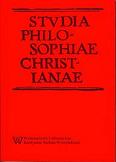The splendour of truth and intrinsically immoral acts II: A philosophical defense of the rejection of proportionalism and consequentialism in "Veritatis Splendor"
The splendour of truth and intrinsically immoral acts II: A philosophical defense of the rejection of proportionalism and consequentialism in "Veritatis Splendor"
Author(s): Josef SeifertSubject(s): Philosophy, Ethics / Practical Philosophy
Published by: Wydawnictwo Naukowe Uniwersytetu Kardynała Stefana Wyszyńskiego w Warszawie
Keywords: intrinsically evil acts; consequentialist ethics; teleological ethics; moral absolutes
Summary/Abstract: The basic message of "Veritatis Splendor" is neither a legalism nor a mere set of ethical absolutes, not even a specifically and exclusively Christian ethic. Rather, the “absoluteness” of the moral calls and the obligatory unconditional rejection of acts that are in themselves evil, lives in the heart of morality as such and especially of Christian morality. How can one understand otherwise the words, where the absolute God reveals himself as the final addressee of any inner-worldly action when he says: “you have done unto me what you have done to the least of my brothers,” and: “what you not have done to the least of my brothers, that you have not done unto me”? What words might reveal more deeply the inner unity between the fundamental option and the specific interpersonal action, as well as the absolute character of the moral Act that is directed to fellow human beings? What words could insist more on the glory of human dignity, but also on the splendour of truth, and the holiness of God that radiate from these words? Perhaps this is the deepest sense of the word of Saint Gregory of Nyssa: "gloria Dei vivens homo est" – "The glory of God is the living human person."
Journal: Studia Philosophiae Christianae
- Issue Year: 51/2015
- Issue No: 3
- Page Range: 7-37
- Page Count: 31
- Language: English

